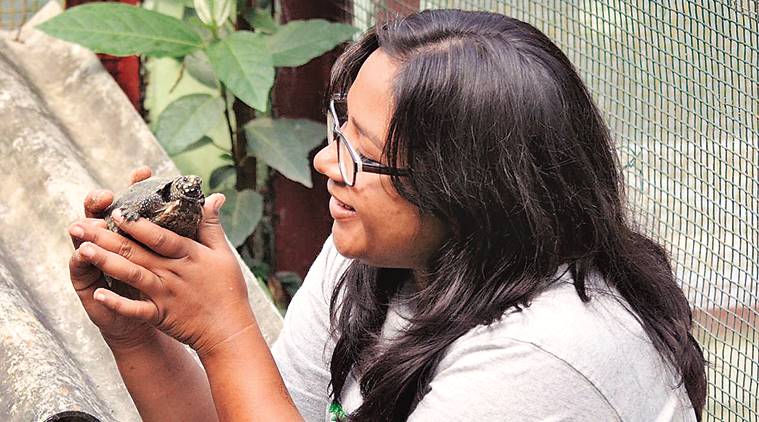News
Poaching of Turtles Skyrockets as Demand for them as Pets Rises

Poaching of turtles, driven by rising demand for pets in the United States, Asia, and Europe, according to wildlife trade experts, is contributing to a worldwide decline of rare freshwater turtles and tortoises.
According to one study, over half of the 360 surviving turtle and tortoise species face extinction.
Such concerns have prompted proposals to strengthen freshwater turtle protection at the International Trade of Endangered Species of Wild Fauna and Flora meeting in Panama.
Precise figures on the turtle trade, particularly illegal, can be difficult. Tara Easter, a doctoral candidate at the University of Michigan who studies the trade, estimated the commercial export trade for mud turtles in the United States increased from 1,844 in 1999 to nearly 40,000 in 2017 and for musk turtles from 8,254 in 1999 to more than 281,000 in 2016.
The United States and several Latin American countries cited data from Mexico in their CITES proposal to ban or limit commercial trade in more than 20 mud turtle species, finding that nearly 20,000 were confiscated, mostly at the Mexico City airport, between 2010 and 2022.
Freshwater turtles are among the world’s most trafficked animals, targeted by criminal networks connecting with buyers on the internet before transporting them to black markets in Hong Kong and other Asian cities. They are then sold as pets, collectors, commercial breeding, food, and traditional medicine.
The Turtle Trade is poorly regulated.
The lucrative business — some turtle species prized for their colourful shells or unusual appearance can fetch thousands of dollars in Asia.
Poachers are especially dangerous, according to experts, because they target rare turtle species and adult breeding females.
Many turtle species, which can live for decades, do not reach reproductive maturity for at least a decade.
“The loss of large numbers of adults, particularly females, can send turtles into a spiralling decline from which they cannot recover,” said Dave Collins, Turtle Survival Alliance’s director of North American turtle conservation. “Turtles reproduce at an extremely low rate, producing only a few eggs per year.”
The United States Association of Reptile Keepers, which advocates for responsible private ownership and trade in reptiles and amphibians, stated that “limiting captive breeding and legal trade is counterproductive in addressing reductions in wild populations.”
“If there aren’t enough of a species on Earth,… the solution should be to create more of them,” Daniel Parker, the group’s Florida chapter’s director of media, said in a statement. “By cracking down on breeding and trade, authorities are missing out on potentially effective free market conservation solutions.”
Since 2018, the Collaborative to Combat the Illegal Trade in Turtles, a group of mostly state, federal, and tribal biologists dedicated to combating North American turtle poaching, has documented at least 30 major smuggling cases in 15 states. Some involved only a few dozen turtles, while others involved thousands.
Over the last 20 years, Easter at the University of Michigan has identified 59 cases involving approximately 30,000 illegally traded turtles in the United States.
Earlier this year, a federal judge in North Carolina sentenced a man to 18 months in prison and fined him $25,000 for violating the Lacey Act by trafficking turtles. The law prohibits the illegal taking, possessing, transporting, or selling of fish, wildlife, or plants.
Through a middleman, the man trafficked 722 eastern box turtles — North Carolina’s state reptile — as well as 122 spotted turtles and three wood turtles for markets in Asia. The turtles are worth $1.5 million in Asia, and the man received more than $120,000 for them.
After previously pleading guilty to financing a nationwide smuggling ring that sent 1,500 turtles worth more than $2.2 million from the United States to China, a Chinese national was sentenced to 38 months in prison and fined $10,000 for money laundering in 2021.
The man used PayPal to buy the turtles from American buyers, advertised them on social media and reptile websites, and sold them to reptile markets in Hong Kong.
A New Jersey man was sentenced to two years probation and ordered to pay $350,000 in restitution and fines in 2020 for transporting 1,000 three-toed and western box turtles from Oklahoma to New Jersey in candy wrappers and socks.
The illegal trade has prompted governments to propose listing 42 turtle species under CITES for the first time, including North American musk turtles.
Although some species, such as the eastern musk turtle, are common, a listing means that traders will need a permit to sell them internationally.
Commercial sales of other species, such as alligator snapping turtles, which can weigh up to 200 pounds and are found in the Gulf states of the United States, would be restricted.
Proposals would also tighten regulations on 13 others who are already protected.
“We think that’s important because of the trends that we’ve seen over the last couple of decades in international reptile and particularly turtle trade,” said Matthew Strickler of the U.S. Department of the Interior, who will lead the American delegation at CITES.
“There is significant demand from Southeast Asia for food and the pet trade, but there is also demand from Europe for pets,” he said. “We’ve seen a pattern of turtles being depleted in one location, followed by poachers, traffickers, and traders moving to another.” Southeast Asia had been depleted. They relocated to Africa. They are now relocating to the Americas.”
A Rhode Island Environmental Police intern discovered the tiny musk turtles for sale online. They only cost $20 each. The turtles are brown or black with a white or yellow line down the middle of their heads and can live for decades.
In September, police arrested the seller after arranging an undercover purchase at his home. The seller paid a $1,600 fine for illegally possessing a reptile. The turtles, now quarantined at the Providence Zoo, are expected to be healthy and disease-free when released back into the wild.
“When native species are removed even for pets, it has a significant impact,” said Harold Guise, an environmental police detective who handled the case. “Wildlife commercialization impacts wildlife that we can’t measure until it’s too late.” We must get ahead of these issues.”
It reminded Perrotti, the conservation director, that illegal trade, which was previously focused in Asia, is increasingly occurring in his backyard.
“I couldn’t believe there was a market for it and that someone was mass producing or mass collecting these to make a few dollars,” he said. “It’s a $20 turtle.” That is absurd… Wildlife is not a commodity that can be profited from.”
World
Hamas Official Says Group Would Lay Down Its Arms If An Independent Palestinian State Is Established

ISTANBUL (AP) — A senior Hamas leader informed The Associated Press that the Islamic extremist organization is prepared to accept a ceasefire lasting five years or more with Israel. Additionally, Hamas would disarm and transform into a political party on the condition that an independent Palestinian state be established based on the borders that existed before 1967.
Khalil al-Hayya’s remarks in a Wednesday interview occurred during a deadlock in the ongoing negotiations for a cessation of hostilities in Gaza. The proposition that Hamas would disarm seemed to be a substantial concession by the militant group that is publicly dedicated to the destruction of Israel.
AP – VOR News Image
Hamas Official Says Group Would Lay Down Its Arms If An Independent Palestinian State Is Established
However, it is improbable that Israel would entertain such a possibility. The Israeli government has made a firm commitment to eliminate Hamas after the devastating Oct. 7 strikes that sparked the conflict. Furthermore, the current leadership of Israel strongly opposes the establishment of a Palestinian state on the territories that Israel gained control of during the 1967 Middle East war.
Al-Hayya, a prominent Hamas official who has been involved in discussions for a ceasefire and hostage exchange on behalf of the Palestinian militants, expressed a combination of defiance and conciliation.
Al-Hayya expressed Hamas’ desire to join the Palestine Liberation Organization (PLO), led by the Fatah side, in order to establish a consolidated government for both Gaza and the West Bank during an interview with the AP in Istanbul.
He stated that Hamas would agree to the establishment of an independent Palestinian state in the West Bank and Gaza Strip, with full sovereignty, and the repatriation of Palestinian refugees in compliance with international agreements. This would be based on Israel’s borders before the 1967 war.
He stated that Should that occur, the group’s military faction would disband.
“What actions have these forces taken after gaining independence and securing their rights and state, considering the experiences of individuals who fought against occupying forces?” “They have transformed into political parties, and their defensive combat units have transformed into the national army,” he stated.
Throughout the years, Hamas has occasionally adjusted its public stance about the potential establishment of a Palestinian state alongside Israel. However, its political agenda publicly refuses to consider any other option but the complete liberation of Palestine, encompassing the territory extending from the Jordan River to the Mediterranean Sea, which includes the regions currently occupied by Israel.
Al-Hayya did not clarify if his seeming acceptance of a two-state solution would lead to a resolution of the Palestinian-Israeli issue or serve as a temporary measure toward the group’s ultimate objective of annihilating Israel.
Ophir Falk, a foreign policy adviser to Israeli Prime Minister Benjamin Netanyahu, refrained from providing a response to Al-Hayya’s remarks, categorizing him as a “prominent terrorist.” However, he stated that Hamas had violated a previous ceasefire by launching an onslaught on southern Israel on Oct. 7, resulting in the deaths of over 1,200 individuals, primarily civilians. Approximately 250 hostages were forcibly taken by militants into the enclave.
According to local health experts, Israel’s subsequent intense bombing and ground attack have resulted in the deaths of over 34,000 Palestinians, with the majority being women and children. Additionally, this has led to the displacement of almost 80% of Gaza’s population, which amounts to 2.3 million people.
“The government led by Prime Minister Netanyahu has undertaken a mission to completely eliminate Hamas’ military and governing abilities in Gaza, liberate the hostages, and guarantee that Gaza will not pose a danger to Israel and the rest of the civilized world in the coming times,” he stated. “The attainment of those objectives is assured.”
The PLO and the Fatah-led Palestinian Authority, which is the internationally recognized self-governing body that Hamas expelled from Gaza in 2007, did not respond immediately. This happened a year after Hamas won the Palestinian legislative elections. Following the Hamas takeover of Gaza, the Palestinian Authority was tasked with governing semi-autonomous areas of the Israeli-occupied West Bank.
The Palestinian Authority aspires to build a sovereign state in the West Bank, east Jerusalem, and Gaza, which Israel seized during the 1967 Mideast conflict. Although most of the world community strongly backs a two-state solution, Netanyahu’s uncompromising administration opposes it.
The ceasefire discussions in Gaza have reached an impasse after almost seven months of conflict. Israel is currently making arrangements for a military operation in the southern city of Rafah, which has become a refuge for over 1 million Palestinians.
Israel claims to have dissolved the majority of the original twenty-four Hamas battalions since the beginning of the conflict. However, it states that four battalions are still surviving and are currently located in Rafah. Israel contends that launching a Rafah attack is vital to secure a decisive triumph over Hamas.
AP – VOR News Image
Hamas Official Says Group Would Lay Down Its Arms If An Independent Palestinian State Is Established
Al-Hayya expressed that such a military operation would not be successful in completely eradicating Hamas. According to him, there is continuous communication between the political leadership outside of Gaza and the military leadership inside Gaza during the conflict. They consult with each other to make decisions and give directives.
The Israeli troops had only managed to incapacitate less than 20% of Hamas’ capabilities, both in terms of personnel and equipment, according to his statement. “If they are unable to completely defeat Hamas, what is the resolution?” The resolution lies in reaching an agreement.
In November, a seven-day period of temporary cessation of hostilities resulted in the liberation of over 100 captives in return for the release of 240 Palestinian detainees detained in Israel. However, negotiations for a lasting ceasefire and the liberation of the remaining captives are currently at a standstill, as both parties are accusing each other of being uncompromising. The primary participant, Qatar, has recently stated that it is thoroughly evaluating its position as a mediator.
The majority of Hamas’ prominent political figures, who were previously situated in Qatar, left the Gulf nation last week and journeyed to Turkey. In Turkey, Hamas’ political leader Ismail Haniyeh met with Turkish President Recep Tayyip Erdogan on Saturday. Al-Hayya refuted the possibility of relocating the group’s primary political office permanently and expressed Hamas’ desire for Qatar to continue serving as a mediator in the negotiations.
Israeli and U.S. officials have alleged that Hamas lacks sincerity in pursuing a compromise.
Al-Hayya refuted this claim, asserting that Hamas has indeed made compromises about the desired quantity of Palestinian detainees to be released in return for the remaining Israeli captives. According to him, the gang lacks precise information regarding the number of hostages that are now in Gaza and are still alive.
However, he stated that Hamas will not yield on its demands for a lasting cessation of hostilities and complete departure of Israeli forces, both of which Israel has refused to accept. Israel has declared its intention to persist with military operations until Hamas is decisively vanquished and will maintain a security presence in Gaza after that.
AP – VOR News Image
Hamas Official Says Group Would Lay Down Its Arms If An Independent Palestinian State Is Established
“Given the lack of guarantee regarding the termination of the war, I see no reason to surrender the prisoners,” stated the Hamas commander in reference to the hostages who are still being held.
Al-Hayya further insinuated that Hamas might launch an attack against Israeli or other forces that may be stationed near a floating dock, which the U.S. is hastily constructing along Gaza’s coastline to provide relief via water.“We firmly refuse any presence in Gaza that is not Palestinian, whether it be at sea or on land, and we will treat any military force in these areas, whether Israeli or from another country, as an occupying force,” he stated.
Al-Hayya stated that Hamas does not feel remorse for the Oct. 7 attacks despite the immense devastation it has inflicted upon Gaza and its inhabitants. He refuted the claim that Hamas terrorists deliberately attacked people during the assaults despite the abundance of compelling evidence suggesting otherwise. Additionally, he asserted that the operation achieved its objective of refocusing global attention on the Palestinian issue.
According to him, Israeli efforts to eliminate Hamas will ultimately prove ineffective in preventing future armed uprisings by Palestinians.
“Suppose they have eradicated Hamas.” “Have the Palestinian people disappeared?” he inquired.
SOURCE – (AP)
News
Ukraine Is Putting Pressure On Fighting-Age Men Outside The Country As It Tries To Replenish Forces

KYIV, Ukraine (AP) — Ukraine is currently procuring additional weaponry and ammunition from a substantial aid package provided by the United States. Simultaneously, Ukraine is taking measures to prevent the outflow of potential soldiers from the country. It has declared that men eligible for conscription will no longer be able to renew their passports while residing outside of Ukraine.
The Cabinet of Ministers announced on Wednesday that only men aged 18 to 60, who are considered physically capable of military service, will be allowed to renew their passports within Ukraine.
AP – VOR News Image
Ukraine Is Putting Pressure On Fighting-Age Men Outside The Country As It Tries To Replenish Forces
Since Russia’s comprehensive invasion in 2022, a significant number of Ukrainians, perhaps millions, have emigrated from the country, primarily seeking refuge in nearby European nations. According to Eurostat, the statistical organization of the European Union, there are currently 4.3 million Ukrainian individuals residing in EU member states, with 860,000 of them being adult males aged 18 or above.
The defense minister of Poland, which has a large Ukrainian diaspora, expressed readiness to assist in facilitating the transfer of those obligated to serve in the military to Ukraine. However, the minister did not provide specific details regarding the means of assistance.
There has been some criticism within Ukraine regarding the move. Ivanna Klympush-Tsyntsadze, an opposition legislator and the chair of the Parliamentary Committee for Ukraine’s European Integration, warned that refusing military-age men access to consular services could result in legitimate legal challenges at the European Court of Human Rights.
“I believe that these actions will simply compel a significant number of Ukrainians to seek alternative means of acquiring citizenship from foreign nations,” she stated.
The population of Russia, which is about 150 million, greatly exceeds that of Ukraine, which is 38 million. Additionally, Moscow has access to a significantly larger military force. Ukraine has decreased the age at which individuals can be conscripted into the military from 27 to 25 to increase the number of its armed forces.
Oleksandr Pavlichenko, the executive director of the Ukrainian Helsinki Human Rights Union, expressed that the policy constituted a breach of individual rights and was also unlikely to effectively encourage Ukrainian males to return to their own country from elsewhere.
AP – VOR News Image
Ukraine Is Putting Pressure On Fighting-Age Men Outside The Country As It Tries To Replenish Forces
“It is merely an emotional progression, not a legal one,” he stated. “It will not yield the desired outcomes.”
Ukraine requires additional military personnel to strengthen its forces in the southern and eastern regions, where Russia is aggressively advancing to seize territory from the outnumbered and outgunned Ukrainian troops.
The United States is providing $61 billion in fresh military assistance to Kyiv, which serves as crucial support for the armed forces of Ukraine in their ongoing conflict with Russia that has lasted for almost two years. On Wednesday, President Joe Biden enacted the assistance package into law.
On Wednesday, U.S. authorities verified that the United States discreetly delivered a quantity of long-range missiles to Ukraine last month. This was done in response to Kyiv’s urgent request for the missiles, enabling their forces to target Russian forces far away from the front lines. According to sources, Ukraine employed them for the inaugural time last week to target an airfield in Crimea that is under occupation.
The Army Tactical Missile Systems, also called ATACMs, possess a maximum operational distance of approximately 300 kilometers (equivalent to 190 miles). Additional shipments are anticipated to be dispatched to Ukraine as a component of the recently implemented U.S. assistance program.
Russia displayed a contemptuous attitude towards the probable influence of the weaponry.
“This will not fundamentally alter the result of the special military operation. We will achieve success. “However, it will result in further complications for Ukraine,” stated Dmitry Peskov, the Kremlin spokesperson.
President Volodymyr Zelensky emphasized the importance of practicality in delivering the supplies. Ukrainian forces have faced a severe shortage of artillery ammunition and air defense missiles for six months due to delays in the delivery of U.S. aid caused by disputes in Congress. The Kremlin’s forces have been able to gradually advance in certain areas of eastern Ukraine, resulting in a predominantly attritional battle.
The Ukrainian general staff stated on Thursday that the situation at the front line continues to be challenging.
According to Regional Gov. Ihor Taburets, six individuals sustained injuries in the Cherkasy region of central Ukraine on Thursday when a “high speed target” collided with a crucial infrastructure facility. According to him, a rescue mission was in progress.
Russian military deliberately attacked infrastructure in northern Ukraine by deploying a precision-guided aircraft bomb on the city of Sumy. The Regional Military Administration reported that emergency services were actively addressing the attack and are still working to determine the full extent of the strike’s impact.
According to regional Governor Oleh Syniehubov, an assault occurred near a railway station in the eastern Kharkiv region, resulting in injuries to seven individuals, as reported on Telegram.
AP – VOR News Image
Ukraine Is Putting Pressure On Fighting-Age Men Outside The Country As It Tries To Replenish Forces
During a visit to Kyiv, the Chancellor of the Exchequer of Britain called on all NATO member countries to raise their defense spending to 2.5% of their Gross Domestic Product (GDP) to support Ukraine and exert greater pressure on Russian President Vladimir Putin.
During his visit on Wednesday, Treasury chief Jeremy Hunt informed Zelenskyy that the United Kingdom is committed to sustaining its existing level of military assistance, amounting to approximately 3 billion pounds ($3.8 billion) in 2024, for an indefinite period of time.
The U.K. Prime Minister, Rishi Sunak, announced that his country’s defense expenditures will rise to 2.5% of GDP by 2030, up from its present level of slightly over 2%. Sunak moreover revealed 500 million pounds ($625 million) in fresh assistance for Ukraine, encompassing ammunition, trucks, boats, and 1,600 strike and air defense missiles.
SOURCE – (AP)
U.K News
UN Calls For Investigation Into Mass Graves Uncovered At Two Gaza Hospitals Raided By Israel

The United Nations (U.N.) Gaza The United Nations has urged for a thorough and reliable investigation into the mass graves discovered at two prominent hospitals in war-ravaged Gaza, which were seized by Israeli troops.
According to U.N. spokesman Stephane Dujarric, credible investigators must be granted access to the locations. Additionally, Dujarric emphasized the importance of ensuring the safety of journalists in Gaza so that they may accurately report on the facts.
AP – VOR News Image
UN Calls For Investigation Into Mass Graves Uncovered At Two Gaza Hospitals Raided By Israel
Volker Türk, the U.N. human rights chief, expressed his deep shock at the destruction of the Shifa medical complex in Gaza City and Nasser Hospital in Khan Younis. He also mentioned the disturbing finding of mass graves in and around these facilities after the departure of the Israeli forces.
The individual demanded impartial and open inquiries into the fatalities, emphasizing that “considering the current atmosphere of exemption from punishment, this should involve investigators from the international community.”
“Hospitals are afforded significant protection under international humanitarian law,” Türk stated. “The deliberate act of killing civilians, detainees, and individuals who are unable to participate in combat is considered a war crime.”
Vedant Patel, the spokesperson for the U.S. State Department, expressed deep concern over the accusations of mass graves at the hospitals and confirmed that U.S. officials have formally requested information from the Israeli government.
The Israeli military has excavated the bodies that Palestinians had previously buried as part of their efforts to locate the remains of hostages taken by Hamas during their attack on October 7th, which initiated the war. The soldiers conducted a thorough examination of the bodies in a dignified manner and promptly returned those that did not belong to Israeli hostages to their original location.
The Israeli military asserts that it eliminated or apprehended numerous militants who had sought refuge within the two hospital complexes, although these assertions could not be independently confirmed.

CNN – VOR News Image
UN Calls For Investigation Into Mass Graves Uncovered At Two Gaza Hospitals Raided By Israel
On Monday, the Palestinian civil defense in the Gaza Strip said that they had discovered 283 corpses in a makeshift cemetery located within the primary hospital in Khan Younis. This cemetery was established during the recent period of Israeli forces surrounding the hospital. According to the group, during that period, individuals could not inter the deceased in a designated burial ground and instead excavated graves within the hospital premises.
According to the civil defense, certain corpses were identified as individuals who were slain during the hospital siege. Additional casualties occurred as a result of the Israeli military’s incursion into the hospital.
The hospital strikes have decimated Gaza’s health sector, which is already struggling to handle the increasing casualties resulting from more than six months of warfare, according to Palestinian health officials.
The matter of who is eligible or responsible for an investigation remains uncertain.
Dujarric stated that for the United Nations to carry out an investigation, authorization from one of its main bodies is required.
“I believe it is not appropriate for anyone to make premature judgments about the outcomes or the individuals responsible,” he stated. “I believe that the investigation should have both access and credibility.”
Karim Khan, the head prosecutor of the International Criminal Court, emphasized the importance of investigating any offenses committed by Hamas terrorists and Israeli forces during his visit to Israel and the West Bank in December.
According to Dujarric, the unearthing of the graves serves as an additional justification for implementing a cease-fire, resolving the conflict, ensuring increased humanitarian access and the delivery of essential products, providing enhanced protection for hospitals, and securing the release of Israeli prisoners.

NDTV – VOR News Image
UN Calls For Investigation Into Mass Graves Uncovered At Two Gaza Hospitals Raided By Israel
The Hamas assault that initiated the conflict resulted in the deaths of over 1,200 individuals, predominantly non-combatants, and the abduction of roughly 250 captives. Israel reports that the terrorists currently have approximately 100 hostages and the remains of over 30 additional individuals in their possession.
Local health authorities report that over 34,000 Palestinians have died as a result of Israel’s military campaign in Gaza to eradicate Hamas. Approximately two-thirds of the casualties are comprised of children and women. The devastation of Gaza’s two major cities has resulted in a humanitarian crisis, causing almost 80% of the population in the area to seek refuge in other sections of the besieged coastal enclave.
SOURCE – (AP)
-
Celebrity5 months ago
Shane MacGowan, Lead Singer Of The Pogues And A Laureate Of Booze And Beauty, Dies At Age 65
-
Entertainment5 months ago
Robert Downey Jr. Won’t Be Returning To The Marvel Cinematic Universe As Tony Stark
-
Politics5 months ago
Former US Secretary Of State Henry Kissinger Dies Aged 100
-
Politics5 months ago
Unveiling the Power and Influence of The Conservative Treehouse
-
Celebrity5 months ago
WWE Hall Of Famer Tammy ‘Sunny’ Sytch Sentenced To 17 Years In Prison For Fatal DUI Crash
-
Sports4 months ago
Saints’ Aggressive Play-Calling Ends Up Coming Back To Hurt Them In Loss To Rams














































